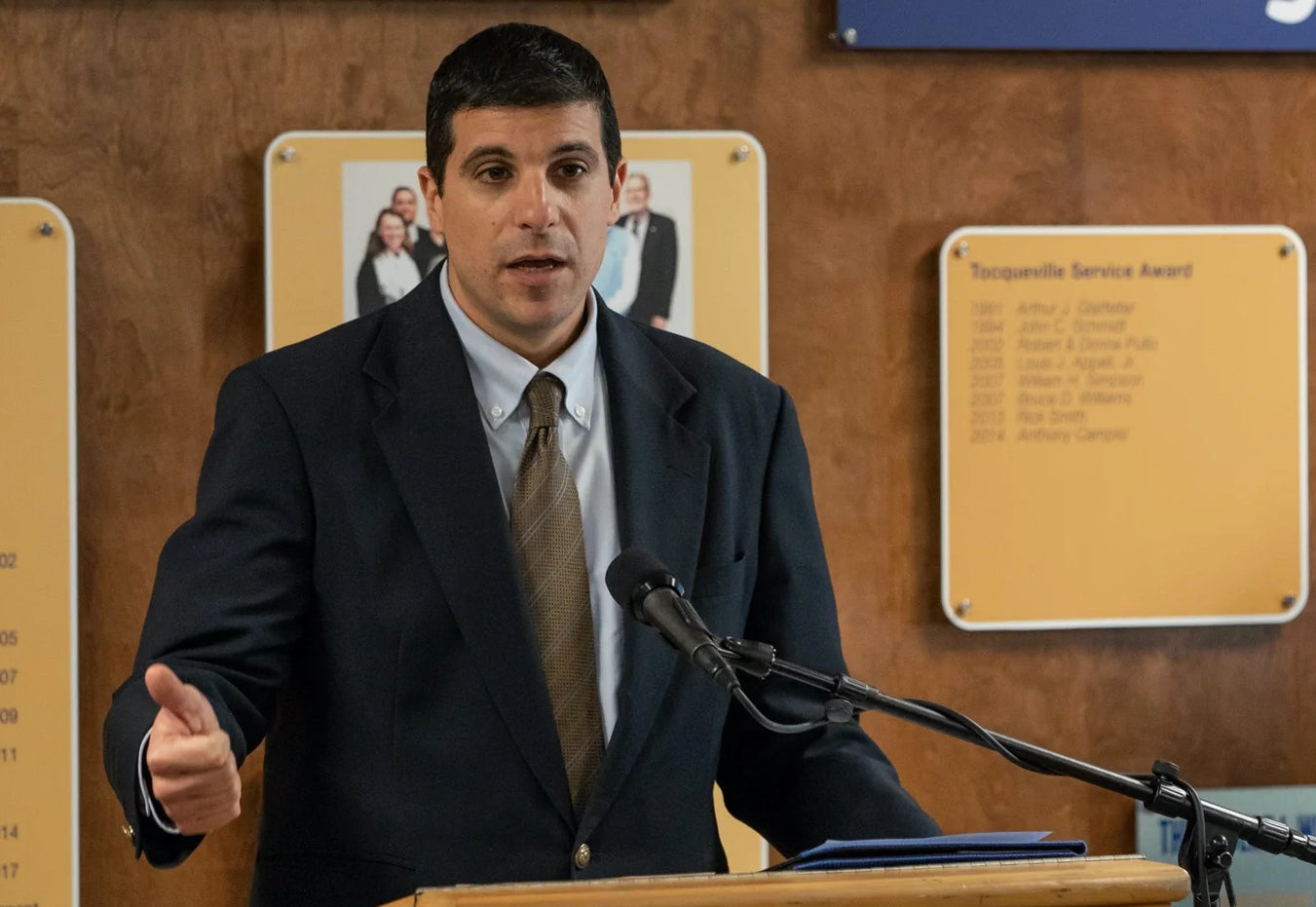Pennsylvania
Pennsylvania is failing disabled individuals & their families | Opinion

Pennsylvania is failing individuals with intellectual and developmental disabilities (IDD) and their families. There’s no other way to say it.
This isn’t something that happened overnight, either. We all saw it coming. Years of chronic underfunding have pushed the state’s support system past its breaking point to this moment of reckoning.
Today, family members are quitting their jobs to fulfill the role that direct support professionals (DSPs) once provided.
Over the long-term, DSPs got to know the individuals and families they worked with, creating consistency of care, improved outcomes, and high-quality supports. But without them, the burden falls entirely to family members.
It’s unsustainable—and dangerous.
Individuals in crisis find it harder to access care, if they can find it at all, and their loved ones have no respite. Family caregivers are physically and emotionally strained and financially drained, with nowhere to turn for help, as programs reduce or eliminate services entirely.
Individuals with cognitive or behavioral disabilities, as well as sometimes physical disabilities, require extensive accommodations and supports, and often direct and continuous supervision. They’re not getting it. Family members can only do so much without help.
The Arc of Pennsylvania is the state’s largest and leading advocacy organization promoting the human rights of individuals with intellectual and developmental disabilities. We have more than 8,000 members in 30 chapters across the commonwealth.
The current situation is unlike anything we have ever seen.
Providers are terminating programs, closing facilities and care centers, or limiting the number of people they serve because of staffing shortages. Individuals approved for services cannot find providers with the capacity to offer the services they need and to which they are entitled.
This is especially true for the approximately 35,000 individuals with intellectual and developmental disabilities or autism who live at home rather than in a community setting. They’re stuck at home, with nowhere to go.
Socialization is an essential part of care. So is personal fulfillment.
But insufficient rate schedules have resulted in the closure of vocational programs where disabled individuals could achieve daily living goals in a safe and welcoming environment.
The pain is real across the spectrum of services these individuals and their families need and deserve. It is heartbreaking to hear and see these stories.
The quality of life for individuals with intellectual and developmental disabilities has diminished greatly—and only promises to worsen without immediate action.
As a commonwealth, we have a responsibility to take care of our most vulnerable residents. But policy-makers at every level have turned their collective backs on individuals with intellectual and developmental disabilities, instead relying on families to prop up a critical life-support system that the state won’t adequately support.
This crisis has devastated families and individuals across Pennsylvania.
State lawmakers have the opportunity—and responsibility—to help by increasing human services funding in the 2023-24 fiscal year budget. We’re way past kicking the can down the road—again.
These individuals have waited long enough, and their families have propped up the system for far too long. It’s time we give them the support they need and truly deserve.
Sherri Landis is the executive director of The Arc of Pennsylvania.

Pennsylvania
Pa. Consumer Advocate resigns, claiming utilities lobbied for his ouster

Talk of lobbying against Cicero by utilities
The investor publication speculated Sunday’s win would likely mean a move to a “more moderate” Consumer Advocate.
“We view this as an indicator of the water industry’s strong political influence in Pennsylvania, which is a key factor that has enabled the state to consistently rank among the most attractive states for water utilities to do business,” Northcoast Research wrote.
The letter of support for Cicero includes signatures by the Pennsylvania Municipal Authorities Association, which represents more than 700 municipal authorities statewide, the publicly owned Chester Water Authority, the Pennsylvania Utility Law Project, Community Legal Services and several housing, health and environmental organizations.
In his resignation letter, Cicero said the “utilities’ actions” and Sunday’s decision to open the position to other candidates “cannot be separated.”
“Collectively, they challenge the integrity and independence of the office and erode the public trust in the impartiality of the regulatory process and signal a concerning shift, where public accountability and consumer protection are subordinate to corporate interests,” Cicero wrote.
Sunday’s statement did not directly address these allegations, but said his administration will prioritize “having a capable, unbiased and apolitical” Consumer Advocate to protect the interests of consumers.
“Its work is vital to all Pennsylvanians, especially the most vulnerable among us,” Sunday said. “I look forward to an open and transparent process that includes feedback from all interested parties and individuals.”
A spokesperson for Sunday’s transition team declined to answer questions about whether utilities had asked Sunday to replace Cicero.
Several utilities are represented on Sunday’s transition committee. Members include David Kralle, a registered lobbyist for Peoples Gas, Aqua Pennsylvania and parent company Essential Utilities; David Fisfis, general counsel and vice president of energy policy at Duquesne Light Company; and Carolina DiGiorgio, vice president of government and external relations at PECO.
Sunday is also inviting consumer advocacy organizations to join the transition committee and seeking feedback on what to look for in the next Consumer Advocate, he said in his statement.
PECO and Duquesne Light did not respond to a request for comment.
Aqua America declined to comment on Cicero’s resignation as well as on Kralle’s participation in Sunday’s transition committee.
In a statement, American Water said it was not involved in the process.
“Pennsylvania American Water is committed to transparency and maintaining the trust of our customers and stakeholders,” spokesperson Gary Lobaugh said in an email. “Pennsylvania American Water has not been involved in any efforts to influence the selection or retention of the Consumer Advocate. Our focus remains on providing reliable and high-quality service to our customers, and we respect the independent processes that govern the appointment of the Consumer Advocate.”
A Consumer Advocate who scrutinized the water sale process
Acquisitions of aging municipal water supplies by investor-owned utilities are increasing across the United States and in Pennsylvania as some municipalities struggle to upgrade infrastructure to meet new drinking water standards.
But purchases of municipal systems by companies often come with a higher cost to consumers — something Cicero has not been quiet about. Several states, including Pennsylvania, have passed fair market value laws, which allow companies to factor in the potential future value of a utility when purchasing it, pay above the price and essentially recover the cost of inflated acquisition prices through rate increases.
A Cornell University study of the 500 largest community water systems in the U.S. found that Pennsylvania has some of the highest utility bills following privatization.
Investor-owned utilities often argue privatization is necessary to “save” struggling municipal-owned systems. Though Cicero does not oppose privatization when necessary, he has argued Pennsylvania’s fair market value law allows companies to purchase “perfectly viable” systems for the sake of making more money.
“We are not anti-privatization, and we are not against well-thought-out consolidation and regionalization,” he said during a 2023 state House committee hearing on legislation aiming to amend the state’s fair market value laws. “What we oppose is privatization for its own sake — and privatization and consolidation at any cost or regardless of the cost to consumers.”
On a number of occasions, Cicero has pointed to dramatically increasing water and wastewater costs in Pennsylvania. In fact, fair market value laws have cost consumers more than $85 million more each year than they would have paid without the law.
Cicero’s Office of Consumer Advocate has settled several privatization cases before the PUC, essentially agreeing to allow them to go forward. But he has thrown a wrench in at least two.
In 2023, the Pennsylvania Commonwealth Court sided with Cicero and reversed the Pennsylvania Public Utility Commission’s approval of Aqua Pennsylvania’s purchase of East Whiteland Township’s sewer system for nearly $55 million. Cicero argued the PUC failed to prove the acquisition would provide a public benefit, and that it would raise wastewater costs for thousands of ratepayers.
Early last year, when Pennsylvania American Water applied to the PUC to buy the borough of Brentwood’s sewer system, Cicero urged the commission to approve the application only if it would provide “substantial, affirmative benefits to the public.” He argued PA American had not met its burden of proof that the acquisition would benefit the public interest. The PUC ultimately denied PA American’s acquisition request.
Pennsylvania
Body camera video shows Pennsylvania police officers rescue 2 dogs trapped in frozen pond

Police in Easttown Township, Pennsylvania, are being called heroes after body camera video captured them saving two dogs from an icy pond.
The daring rescue happened Friday around 3 p.m. on Waynesbrooke Road.
In the video, you can hear the sad sound of one of the dogs whimpering as the officers spring into action to rescue the animals from the freezing water.
Officers say when they got to the scene they found two black labs. One of them was not far from the bank, they say, but the other needed to be rescued first after swimming to a much deeper end of the pond.
“If they weren’t able to get themselves out, they may have drowned,” said Charles Burdsall, one of the responding officers.
Burdsall says it was the first call they ever received for a water rescue in Easttown Township. He says their hearts were racing the entire time but they didn’t think twice, knowing every second mattered to save the dogs.
“The only goal at the time was to get the dog out of the pond,” Burdsall said.
Their focus was not only to get the dogs out but to do so without breaking the ice. Luckily, the officers say neighbors were able to give them a ladder and a pole that proved to be exactly what they needed to pull the dogs out.
“[The dog’s] neck was touching the ice. [Burdsall] couldn’t get too close to the dog. We figured the ice was thinner there and we didn’t want him falling in. It was a pretty amped up situation,” Kevin Oreskovich with Easttown Township Police said.
The dogs are doing fine and were reunited with their owner, the officers said.
The officers are now being celebrated as heroes.
“It was rewarding. It felt good,” Oreskovich said.
“Being able to help them when they were in distress,” Burdsall said, “that was big for me.”
Pennsylvania
Pennsylvania Game Commission asking public to report any turkey flocks they see across state

The Pennsylvania Game Commission is asking for the public to report any turkey flocks they see across the state.
The information is being collected through March 15 to help the Game Commission trap them for ongoing projects.
You are asked to provide the date of the sighting, the location and the type of land (public, private or unknown) where the birds were seen. The Game Commission will then assess these sites to potentially trap the bird. Leg bands will be put on the male turkeys and then released back. In four Wildlife Management Units – WMUs 2D, 3D, 4D and 5C – female turkeys, hens, also will be leg banded and about 130 hens also will be outfitted with GPS transmitters, then be released back on site, to be monitored over time.
Trapping turkeys during winter is part of the Game Commission’s ongoing population monitoring, and provides information for large-scale turkey studies, as well.
Hunters who harvest these marked turkeys, or people who find one dead, are asked to report the band number and/or transmitter, either by calling toll-free or reporting it online.
“The data give us information on annual survival rates and annual spring harvest rates for our population model, and provides the person reporting the information on when and approximately where the turkey was banded,” said Mary Jo Casalena, the Game Commission’s turkey biologist. “In the four WMUs where hens are getting the GPS transmitters, we’re studying turkey population and movement dynamics, disease prevalence, and other aspects that may limit populations.”
The studies are being done in partnership with Penn State University and the University of Pennsylvania’s Wildlife Futures Program.
“The public was so helpful the last few years and some even helped with monitoring sites and trapping,” Casalena said. “We look forward to continuing this winter.”
This field study will conclude at the end of December 2025.
Download the FREE WPXI News app for breaking news alerts.
Follow Channel 11 News on Facebook and Twitter. | Watch WPXI NOW
-
/cdn.vox-cdn.com/uploads/chorus_asset/file/25822586/STK169_ZUCKERBERG_MAGA_STKS491_CVIRGINIA_A.jpg)
/cdn.vox-cdn.com/uploads/chorus_asset/file/25822586/STK169_ZUCKERBERG_MAGA_STKS491_CVIRGINIA_A.jpg) Technology1 week ago
Technology1 week agoMeta is highlighting a splintering global approach to online speech
-

 Science6 days ago
Science6 days agoMetro will offer free rides in L.A. through Sunday due to fires
-
/cdn.vox-cdn.com/uploads/chorus_asset/file/25821992/videoframe_720397.png)
/cdn.vox-cdn.com/uploads/chorus_asset/file/25821992/videoframe_720397.png) Technology1 week ago
Technology1 week agoLas Vegas police release ChatGPT logs from the suspect in the Cybertruck explosion
-

 News1 week ago
News1 week agoPhotos: Pacific Palisades Wildfire Engulfs Homes in an L.A. Neighborhood
-

 Education1 week ago
Education1 week agoFour Fraternity Members Charged After a Pledge Is Set on Fire
-

 Business1 week ago
Business1 week agoMeta Drops Rules Protecting LGBTQ Community as Part of Content Moderation Overhaul
-

 Politics1 week ago
Politics1 week agoTrump trolls Canada again, shares map with country as part of US: 'Oh Canada!'
-
/cdn.vox-cdn.com/uploads/chorus_asset/file/23935558/acastro_STK103__01.jpg)
/cdn.vox-cdn.com/uploads/chorus_asset/file/23935558/acastro_STK103__01.jpg) Technology5 days ago
Technology5 days agoAmazon Prime will shut down its clothing try-on program














